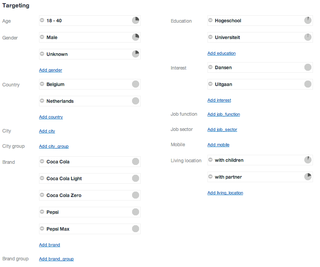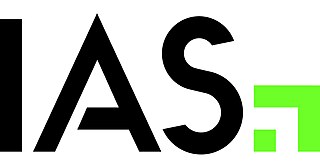
Tagged is a social discovery website based in San Francisco, California, founded in 2004. It allows members to browse the profiles of any other members, and share tags and virtual gifts. Tagged claims it has 300 million members as of 2014. As of September 2011, Quantcast estimates Tagged monthly unique users at 5.9 million in the United States, and 18.6 million globally. Michael Arrington wrote in April 2011 that Tagged is most notable for the ability to grow profitably during the era of Facebook.

Targetedadvertising or data-driven marketing is a form of advertising, including online advertising, that is directed towards an audience with certain traits, based on the product or person the advertiser is promoting.

Infillion, formerly known as Gimbal | true[X], TrueX, Inc. and SocialVibe, is an American digital advertising company founded in 2007 by Joe Marchese, Brandon Mills and David Levy. The company is headquartered in Los Angeles and New York City. It was previously owned by 21st Century Fox, from 2014 until Disney's acquisition of 21st Century Fox in 2019, and The Walt Disney Company from 2019 until 2020.
Criteo S.A. is an advertising company that provides online display advertisements. The company was founded and is headquartered in Paris, France.
OpenX Technologies, Inc. is a programmatic advertising technology company founded in 2008. It has raised over $75 million from Accel, Index, Samsung, Dentsu, Mangrove Capital and others.
InMobi is an Indian multinational technology company, based in Bangalore. Its mobile-first platform allows brands, developers and publishers to engage consumers through contextual mobile advertising. The company was founded in 2007 under the name mKhoj by Naveen Tewari, Mohit Saxena, Amit Gupta and Abhay Singhal.

One by AOL, formerly known as Millennial Media, was an advertising company that places display ads on mobile devices.
140 Proof, Inc. is an advertising company that uses social data from many sources in targeting relevant ads based on consumers' interests as indicated by their social activity across networks.
Drawbridge is a people-based identity management company operating out of San Mateo, California, USA. It has been a subsidiary of LinkedIn since 2019. Drawbridge has built a people-based identity graph and cross-device advertising platform that specializes in using machine learning to match individuals across connected devices, including desktops, smartphones, tablets, and connected TVs, in order to serve more relevant ads across devices.
Mojiva was a mobile advertising network for smartphones and tablet devices. The company was known for introducing an ad network tailored specifically for tablets, known as Mojiva Tab. It rebranded to "mOcean Mobile" before being acquired by Pubmatic. Mojiva raised a total of $42.3 million in venture funding before being bought.
AdTruth is a software product and the digital media division of 41st Parameter, a company headquartered in Scottsdale, Arizona, with regional offices in San Jose, California; London, England; and Munich, Germany. AdTruth allows marketers to recognize and reach target audiences across online devices.
Oracle Advertising, formerly Datalogix, is an American cloud-based consumer data collection, activation, and measurement platform for use by digital advertisers. Datalogix was a consumer data collection company based in Westminster, Colorado that provided offline consumer spending data to marketers that was acquired by Oracle in 2014.
Flurry is an American mobile analytics, monetization, and advertising company founded in 2005. The company develops and markets a platform for analyzing consumer interactions with mobile applications, packages for marketers to advertise in-apps, as well as a service for applying monetization structures to mobile apps. Flurry analyzes 150 billion app sessions per month. The company's analytics platform tracks application sessions in iOS, Android, HTML5, and JavaME platforms. Flurry has raised a total of $65 million in funding since its founding and in March 2014 announced that it would partner with Research Now to create a panel database on mobile users. Flurry was acquired by Yahoo! on July 21, 2014 for somewhere between $200 and $300 million.

4INFO Inc. is an American targeted advertising corporation. The company was owned by Nielsen Holdings. It was acquired by Cadent in 2020.
Firebase was a company that developed backend software. It was founded in San Francisco in 2011 and was incorporated in Delaware.

Integral Ad Science (IAS) is an American publicly traded technology company that analyzes the value of digital advertising placements. Integral Ad Science is known for addressing issues around fraud, viewability and brand risk, as well as TRAQ, a proprietary media quality score.

Carousell is a Singaporean smartphone and web-based consumer to consumer and business to consumer marketplace buying and selling new and secondhand goods. Headquartered in Singapore, it also operates in Malaysia, Indonesia, the Philippines, Taiwan, Hong Kong, Macau, Australia, New Zealand and Canada. Carousell is available on both iOS and Android devices.

Adtile Technologies is an American company that develops and markets motion-sensing technology. The company’s headquarter is in San Diego, California. It is best known for its motion ads, which employs phone's sensors that supports motion as input to make advertisements interactive.
Silverpush is a Singapore based marketing technology provider. It was founded in September 2012, by Hitesh Chawla. After starting push notification advertisement in 2013, it launched India's first DSP platform in 2014. The company is backed by IDG Ventures, Palaash Ventures, Fabrice Grinda, K.Ganesh, 500 Startups, M&S Partners and Freak Out Inc, Japan.
Taboola, Inc. is a publicly traded advertising and technology company headquartered in New York City. It provides "content recommendation" adverts on its partner websites.








